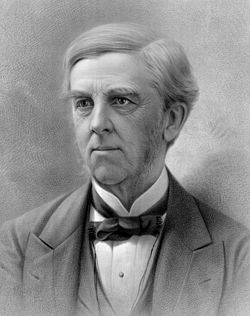Oliver Wendell Holmes Sr. Quote
The Last LeafI saw him once before,As he passed by the door,And againThe pavement stones resound,As he totters o'er the groundWith his cane.They say that in his prime,Ere the pruning-knife of TimeCut him down,Not a better man was foundBy the Crier on his roundThrough the town.But now he walks the streets,And looks at all he meetsSad and wan,And he shakes his feeble head,That it seems as if he said,"They are gone."The mossy marbles restOn the lips that he has prestIn their bloom,And the names he loved to hearHave been carved for many a yearOn the tomb.My grandmamma has saidPoor old lady, she is deadLong agoThat he had a Roman nose,And his cheek was like a roseIn the snow;But now his nose is thin,And it rests upon his chinLike a staff,And a crook is in his back,And a melancholy crackIn his laugh.I know it is a sinFor me to sit and grinAt him here;But the old three-cornered hat,And the breeches, and all that,Are so queer!And if I should live to beThe last leaf upon the treeIn the spring,Let them smile, as I do now,At the old forsaken boughWhere I cling.
The Last LeafI saw him once before,As he passed by the door,And againThe pavement stones resound,As he totters o'er the groundWith his cane.They say that in his prime,Ere the pruning-knife of TimeCut him down,Not a better man was foundBy the Crier on his roundThrough the town.But now he walks the streets,And looks at all he meetsSad and wan,And he shakes his feeble head,That it seems as if he said,"They are gone."The mossy marbles restOn the lips that he has prestIn their bloom,And the names he loved to hearHave been carved for many a yearOn the tomb.My grandmamma has saidPoor old lady, she is deadLong agoThat he had a Roman nose,And his cheek was like a roseIn the snow;But now his nose is thin,And it rests upon his chinLike a staff,And a crook is in his back,And a melancholy crackIn his laugh.I know it is a sinFor me to sit and grinAt him here;But the old three-cornered hat,And the breeches, and all that,Are so queer!And if I should live to beThe last leaf upon the treeIn the spring,Let them smile, as I do now,At the old forsaken boughWhere I cling.
Related Quotes
Let my silence grow with noise as pregnant mothers grow with life. Let my silence permeate these walls as sunlight permeates a home. Let the silence rise from unwatered graves and craters left by bomb...
They took one look at me,And hated my black face.They took one look at me,And decided on my fate.They took one look at me,And forced an unknown fear.They took one look at me,And caused the shed of tea...
It was uncontrollable, overpowered by others, these colors within me, staring out at a black and white world; without spurning about, wanting to rule, too much negligence, they left me no choice, but...
About Oliver Wendell Holmes Sr.
Born in Cambridge, Massachusetts, Holmes was educated at Phillips Academy and Harvard College. After graduating from Harvard in 1829, he briefly studied law before turning to the medical profession. He began writing poetry at an early age; one of his most famous works, "Old Ironsides", was published in 1830 and was influential in the eventual preservation of the USS Constitution. Following training at the prestigious medical schools of Paris, Holmes was granted his Doctor of Medicine degree from Harvard Medical School in 1836. He taught at Dartmouth Medical School before returning to teach at Harvard and, for a time, served as dean there. During his long professorship, he became an advocate for various medical reforms and notably posited the then-controversial idea that doctors were capable of carrying puerperal fever from patient to patient. Holmes retired from Harvard in 1882 and continued writing poetry, novels and essays until his death in 1894.
Surrounded by Boston's literary elite—which included friends such as Ralph Waldo Emerson, Henry Wadsworth Longfellow, and James Russell Lowell—Holmes made an indelible imprint on the literary world of the 19th century. Many of his works were published in The Atlantic Monthly, a magazine that he named. For his literary achievements and other accomplishments, he was awarded numerous honorary degrees from universities around the world. Holmes's writing often commemorated his native Boston area, and much of it was meant to be humorous or conversational. Some of his medical writings, notably his 1843 essay "The Contagiousness of Puerperal Fever", were considered innovative for their time. He was often called upon to issue occasional poetry, or poems written specifically for an event, including many occasions at Harvard. Holmes also popularized several terms, including "Boston Brahmin" and anesthesia. He was the father of Oliver Wendell Holmes Jr., who would become a justice on the Supreme Court of the United States.
